How to Handle the First 24 Hours After Bringing a Baby Home
After bringing an infant home from the hospital, it’s not the time to start developing a schedule or seeing friends. It’s time to welcome the new reality.

The first step over the threshold with an infant tucked away in the car seat is incredibly daunting. Unlike at the hospital, at home there are no nurses to soothe or aid parents. There are no consultants who can help you figure out if the kid is being fed incorrectly. Parents must look to each other for solutions. It’s enough to cause a minor panic attack (and it frequently does). But the good news is that in the first 24 hours after an infant comes home, the most important thing a parent can do is takes some deep breaths.
“Realize that the physician has seen the baby in the hospital and all systems are go,” explains AAP board-certified pediatrician Dr. Lee Jaffee with Philadelphia’s Tri-County Pediatrics. “The baby is feeding okay. They’re stooling okay,. They’re voiding okay. Everything is okay and you have to relax.”
Still, Jaffee points out that just because parents aren’t sent home with a manual, it doesn’t mean they shouldn’t feel prepared. The sheer fact that parent and babies were discharged should indicate that a team of professionals had faith in the abilities of both parent and baby to survive. So that first 24 hours should simply be about keeping the status quo that was established in the hospital.
“It’s more about listening to the babies cues and cries,” says Jaffee. “And feeding and changing diapers.”
As far as feeding goes. Jaffee notes that many parents become frightened the first day back that the infant isn’t eating enough. But he notes that infants eat very little those first few day. In fact, they begin by eating about a tablespoon and work their way up to about an ounce. He stresses that parents need to take everything in stride.
That said there is one important duty a parent should be performing in the first 24 hours, no matter what: resting. “The biggest thing is when the baby sleeps you have to rest,” urges Jaffee. He notes that it really isn’t optional. Keeping active while the baby sleeps will quickly put parents in to rest debt. “That’s when you get exhausted and things get bad.” Because parents will be catching rest as the babies sleep, there’s really no sense in having visitors for the first 24 hours. Yes, it’s likely that the new grandparents will shoulder themselves through the door, but by no means should parents feel they have any obligation to them or anyone else excited to see a new life.
“Everybody wants to see the baby, but you want to try to limit visitors so you can get your rest,” says Jaffee. “If you need to tell people that they need to give you time to relax, that’s fine. You can’t entertain.”
What Parents To Do in the First 24 Hours Home With a Baby
- When the baby rests, take the opportunity to do the same. The first few weeks at home are likely to be tiring so its best to take sleep where you can get it.
- Don’t obsess over whether or not the kid is eating. The doctor did a final check and the reality is that the kid likely doesn’t have much of an appetite yet.
- Takes turns holding the kid and do so together. Bonding is a familiar, not individual, endeavor.
- If you’re the sort of person who feels an overwhelming urge to make schedules, check that impulse. You really can’t reasonably expect a newborn to adhere to a schedule.
Time in the first 24 hours home can feel very strange because it relies on a baby’s cues. This might drive some regimented parents crazy. The temptation to start hammering out a schedule right away can be very strong. Jaffee notes that it’s “simple-minded” to try and build a schedule right through the door. In fact, there likely won’t be a workable schedule for at least the first two months.
In the meantime, it’s very important that both parents get in on the bonding. This can feel difficult for dads, but Jaffee stresses that there are plenty of opportunities for a dad to get into the game, even a partner is breastfeeding. “Dad should be helping mom in the middle of the night,” he says. “Dad should be efficient at, changing the diaper. And there’s no reason Dad can’t hold and rock the baby to sleep and get the bonding.”
Above all, Jaffee stresses again that as long as the infant is eating, pooping and peeing, parents should be doing nothing more in the first 24 hours other than getting good rest. After all, a baby isn’t as fragile as most people imagine. “My line is, in most cases, they survive because of us, but in some cases, they survive in spite of us.”
This article was originally published on